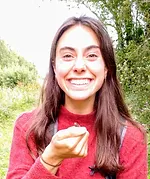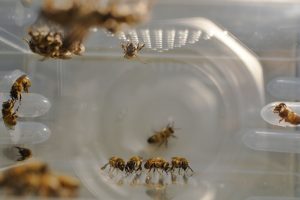
- This event has passed.
Spring Meeting 2023, Norton Priory Museum, Runcorn
11th March 2023
Event Navigation

Norton Priory
The CABK Spring Meeting travels around the country – 2020 in Arkendale, North Yorkshire, 2022 in Nottingham and we are delighted to announce that the 2023 event will be held at Norton Priory Museum, near Runcorn, Cheshire.
Norton Priory Museum & Gardens is one of Cheshire’s hidden gems. Once home to a medieval church, this is the most excavated monastic site in Europe.

The Medieval Undercroft
Visitors can explore the 12th century undercroft with beautiful vaulted ceiling and the priory ruins showing the layout of the medieval buildings. Norton Priory was founded in 1134, and achieved mitred abbey status in 1391. The museum displays thousands of objects discovered at the site, which tell the 900-year history from priory to mansion house and the stories of the people who lived here. The most impressive object in the museum is the twice life-size St Christopher statue.

Norton Priory Woodland
Today, the museum is surrounded by woodland walks, bringing opportunities to discover secret summer houses, sculptures and a stream glade. Norton Priory is home to the National Collection of Tree Quince, and the gardens and grounds support a wide variety of flora and fauna.

Norton Priory Gardens
The Priory is a couple of miles from Runcorn Railway Station; there is plenty of free car parking.
Tickets will include admission to the Garden and Museum plus all refreshments and a buffet lunch, with hot or cold options.
Tickets cost £30
The programme for the day covers various topics within the broad scope of beekeeping and social insect research that the CABK aims to promote. Apart from the talks, there will certainly be time to explore the Priory Museum and lovely gardens.
Come along and bring your beekeeping friends, non CABK members are very welcome.

Stephen Martin
Emeritus Prof. Stephen Martin, University of Salford, Manchester
Stephen has studied social insects (bees, wasps, termites and ants) for most of his career. His areas of specialisation are the ‘hornet ecology’, ‘pest and diseases of honeybees’ and ‘chemical ecology of ants’. He holds a Chair in Social Entomology in the School of Environmental and Life Sciences at Salford University, Manchester. Prior to that he spent 12 years working at Sheffield University, 7 years with the National Bee Unit and 7 years in Japan conducting research into hornets.
Stephen is best known for his work on the Varroa mite and its association with viruses, especially the Deformed Wing Virus, but more recently his expertise in hornet biology is in demand, both nationally and internationally. His team of researchers at Salford, funded in part by beekeepers, are using the very latest molecular methods to read the genetic code of the DWV virus. The aim is to understand why some honey bee colonies have become naturally tolerant to Varroa and see if this information can provide beekeepers with a long-term solution to the problem.

Hannah Wolmuth-Gordon
Hannah Wolmuth-Gordon – Exploring a bumblebee gut parasite
Hannah is in the final year of her PhD at Royal Holloway, University of London. Previously, Hannah completed her undergraduate studies and Masters at the University of Bristol. During her PhD she has used the interaction between the gut parasite, Crithidia bombi, and the bumblebee, Bombus terrestris, as a model system to investigate epidemiological questions. For example, she has explored the impact of the parasite on different aged bumblebees and colonies at different stages of their lifecycle. She has also looked at the effect of temperature on the infectivity of C. bombi.

Lab-reared B. terrestris nest
Hannah’s talk will discuss factors which affect the spread of C. bombi within and between bumblebee colonies. Such as, does the colony lifecycle stage impact the spread of the parasite through the colony and what does the timing of infection mean for the spread of the parasite to the next generation? Investigating questions such as these can improve our understanding C. bombi in bumble bees. These findings can also be applied to the spread of parasites in other social insects.
Dr Paul Cross – Using small drones to track bees across their entire foraging range

Dr. Paul Cross
Paul has kept bees for 15 years. He currently runs 15 colonies on Anglesey and at the Bangor University apiary, which is used for teaching and research purposes. He is involved in supervising a diverse range of bee-related research projects, including the evaluation of bee-keeping as a poverty alleviating tool in Uganda and Tanzania; discrimination of honey bee races in North Wales (in conjunction with BIBBA); the impact of neonicotinoids on solitary bees; two projects developing micro-electronic bee trackers; Dispersal strategies and space use in pollinating bees; and a forthcoming study on tracking of key pollinators in agricultural and natural landscapes.

Is it tea-time? Training bees to a feeder
Long distance drone tracking of key pollinators in agricultural and natural landscapes: Achieving sustainable use of natural resources
Paul and engineering colleagues at Bangor University have developed a revolutionary tracking technology designed to follow honey and bumblebees across their entire foraging range in real time with high accuracy.

Dr Raquel De Sousa
Dr Raquel De Sousa – University of Oxford BeeLab
I am currently a post-doc researcher in the Oxford BeeLab led by Professor Geraldine Wright, a world-class scientist in bee nutrition. My (early stage) beekeeping activities in Northern Portugal sparked the intention to pursue a PhD abroad. In 2014, I joined Prof. Wright’s lab at Newcastle University, where I strived to understand whether adult worker honey bees like mineral salts in food. After my PhD, I joined a project to develop a honey bee pollen substitute for commercial beekeepers. With Prof. Wright and other colleagues, we co-founded a spin-off company, APIX Nutrition (now APIX Biosciences). In the Oxford Beelab, we use laboratory, semi-field and field settings, for example, to understand how bees regulate the intake of nutrients, taste and feeding preferences, how diet influences the immunocompetence, and the brood rearing capacity of bees.
Too much or too little of a good thing? The study of honeybee nutrition.

Bees in test cage
Animals attain optimal nutrition through the regulation of ingested nutrients. Micronutrients (e.g. minerals) ensure physiological and metabolic functions and must be obtained from food. Therefore, these nutrients are necessary for proper insect growth, survival and reproduction. Understanding how nutritional components in diet influence bees at both the individual and the colony level (e.g. brood rearing) is not only essential but necessary. In the first part of this talk, using two-choice feeding assays, we asked whether young workers preferred mineral-enriched over mineral-free sucrose solutions and their preference-aversion thresholds. We demonstrate that adult workers can regulate the intake of mineral salts through pre-ingestive and post-ingestive mechanisms. In the second part, I will describe a new method for measuring how diet influences brood production in honey bee colonies using styrofoam colony nucleus boxes maintained in a semi-field setting (e.g. polytunnel). Because it is difficult to control what the whole colony eats, this setting allowed us to control the environment of the colonies and limit or prevent food from entering the colony. This method standardises the nutrition across individual and intact honey bee colony replicates, enabling reproducibility and requiring fewer apiary resources. It will make it possible for researchers to measure the impact of nutrition on the performance of whole colony populations.
Cancellation Policy – recognising potential future uncertainties, we will be as flexible as possible regarding cancellation and refunds.
In-person bookings will close at midnight on Sunday 5th March to allow final numbers to be provided for catering purposes. Up until that time we will offer a full refund for cancellation.
If we cancel the event, for example because numbers are too low, we will of course make a full refund of any monies paid.
